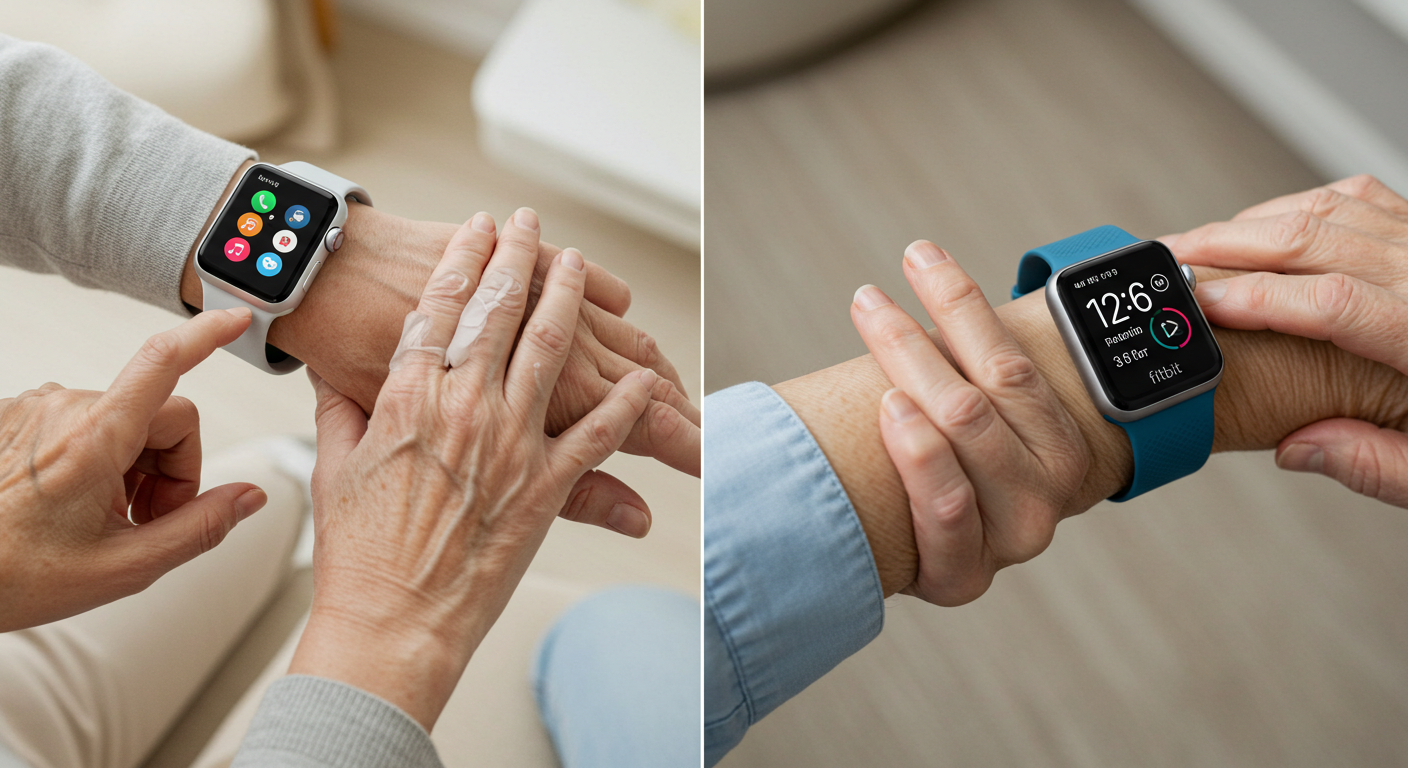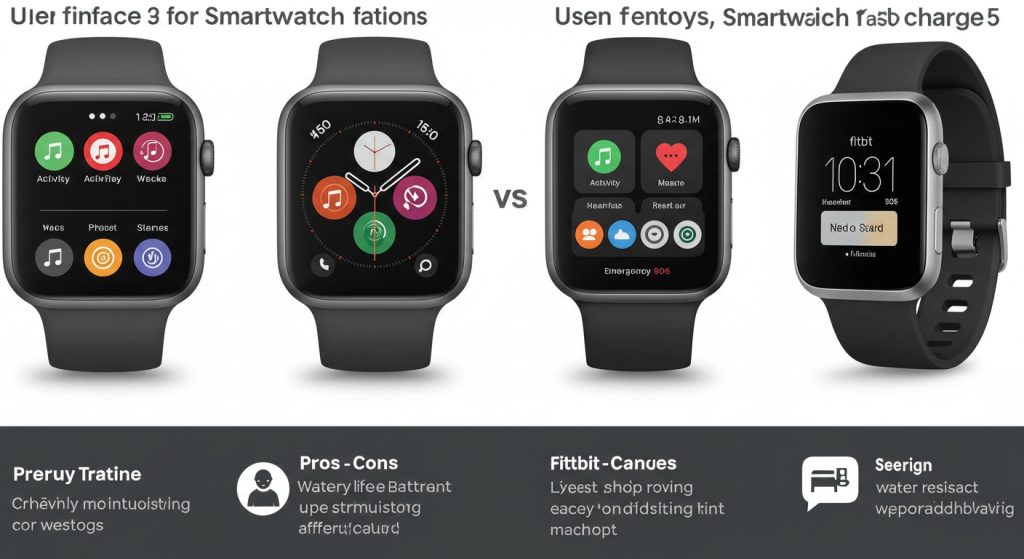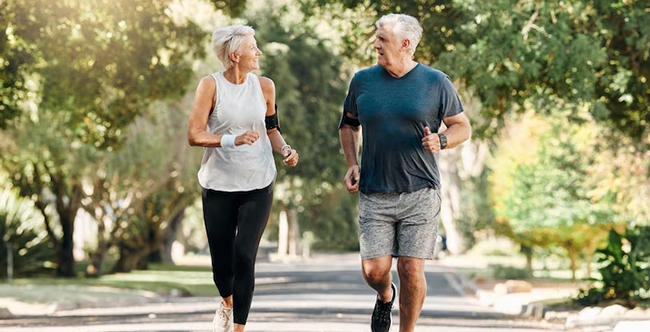Apple Watch Vs Fitbit for Elderly: Watch for Senior Citizens
2025-07-06

Ensuring the Safety and Health of Your Loved Ones
- As we age, the concern for the well-being of our loved ones becomes more important. Advances in technology have provided a digital world whereby technology can help enhance their independence, safety, and overall health. Choosing an Apple Watch or a Fitbit for the elderly may, however, be a daunting task.
- Apple watch vs Fitbit for elderly are feature-packed, supporting health monitoring, encouraging activity, and offering peace of mind in case of an emergency. Each device will be examined in terms of technical specifications, user interface, and other unique benefits that might be relevant to your purchasing decision for the senior members of your family.
The Rise of Wearable Technology for Seniors
- Wearable technology for seniors has brought other newer ways of providing senior care. The watches and bands go towards real health care as partners for the aged. These range from ones that can detect a fall if one occurs, remind somebody to take their pills, or even allow for emergency alerts to the family. As a result, there is an incredible difference in terms of the health status of elderly adults and the reduction of anxiety of their guardians and caregivers, which leads to their living a life of ease.
- A smartwatch for seniors is often picked primarily as a choice driven by enhanced safety and proactive health conditions. When comparing features, reviewing their upsides and downsides, and looking for recommendations about the best fitness trackers for the elderly, users are actually after devices that will entirely suit their specific tastes.
Apple Watch for Seniors Vs. Fitbit for Seniors: A Head-to-Head Battle of Features
Let us find out what different interesting technical characteristics are beneath two popular senior wearable devices, apple watch vs Fitbit for elderly, by conducting a deep senior wearable device comparison. One of the most important health and safety features for the elderly is a fall-detection smartwatch. In this light, the Apple Watch and Fitbit provide some of the best offerings available today. The fall detection smartwatch for seniors is probably the most crucial one of all. A sudden fall can be disastrous.
1. Apple Watch
- Apple Watch (Series 4 and newer, including the latest Series 10): Apple is are extremely advanced fall-detection smartwatch for seniors. It involves analyzing wrist trajectory and impact acceleration through the use of accelerometers and gyroscopes.
- If the watch detects a significant fall, it taps the wearer’s wrist, sounds an alarm, and displays an alert. If there is no response within 60 seconds, emergency services are automatically called, and an emergency message is sent with the wearer’s location to designated emergency contacts.
- False positives are kept to a minimum while ensuring that genuine falls are promptly detected and rescued. This emergency SOS smartwatch elderly feature is a true lifesaver.
2. Fitbit (Sense 2)
- Fitbit has traditionally been more fitness-focused; the Sense 2 has marked its entry into the rudimentary fall detection category. It has sensors that are the same as Apple in sensing rough falls. However, their implementation in terms of emergency connectivity mightn’t be as strong or as ubiquitous as that of Apple Inc.
- For instance, it often requires the company of a connected phone, and emergency calls might be made manually otherwise after receiving a fall detection alert. In this regard, the edge is for the Apple Watch, which is a more complete solution.

ECG Monitoring Smartwatch & Heart Rate Monitoring:
Senior citizens are very concerned about their cardiovascular health. In either case, apple watch vs fitbit for elderly units provides worthwhile information.
- Apple Watch (Series 4 and newer, including the latest Series 10): The Apple Watch has a built-in electrical heart sensor that can take an ECG on the wrist to screen for atrial fibrillation (AFib). AFib is a heart condition that can put individuals at a higher risk of stroke. It also provides continuous HR data to the user’s Apple Health app that could be shared with a provider.
- Fitbit (Sense 2, Charge 6): A number of Fitbit models are able to perform EKG monitoring, including Sense 2 and Charge 6. Fitbit’s devices can also watch for arrhythmias and change the color on the screen to display one. Fitbit often displays heart rate ranges and trends in a more user-friendly way through its app, making it easier for seniors and their caregivers to understand their condition.
Medication Reminders Smartwatch:
Medication compliance can be critical in older adults.
- The Apple Watch has a Medications feature through the iOS Health app. With the help of these reminders, which can be seen directly on the wrist of people, users will have the ability to customize the alerts with details concerning doses and timings of certain drugs to facilitate their adherence to prescriptions.
- Fitbit Watches: The current operating system of Fitbit Watches does not have as many robust integrated plans for medications as the one designed by Apple. Situations where one may use this feature as a primary focus for zones like Sensorem do exist.
GPS Tracking for Seniors Smartwatch
GPS is a must-have for elderly individuals who wander around or engage in outdoor activities.
- The cellular models of the Apple Watch (GPS + Cellular models) can be used for independent GPS tracking, as the devices have GPS tracking for elder watches that operate independently of an iPhone (Apple, 2020). A lost loved one can be found, and his/her outdoor activities can be tracked to improve accuracy, especially if multi-channel designs and high-sensitivity chipsets are used.
- Several fitness watches from Fitbit have GPS built into them to track outdoor workouts. However, for continuous, standalone GPS tracking for seniors without a paired phone, only certain advanced models or specialized medical alert systems, such as Theora Connect, can do this. Consumer-grade GPS trackers typically have an accuracy of less than 10 meters, which is adequate for most senior tracking needs.
Benefits & Concerns: A Balanced Perspective
- Improved Safety: Fall detection, emergency SOS.
- Proactive Health Management: Heart rate, ECG, SpO2, activity tracking, sleep monitoring.
- Independence: GPS tracking for navigation and peace of mind for loved ones.
- Convenience: On-wrist notifications, voice assistants, and medication reminders.
- Motivation: Encouragement to stay active and achieve health goals.
Smartwatch Pros for Seniors:
Apple Watch Pros:
- Better fall detection and emergency capabilities.
- Advanced health monitoring (ECG, irregular rhythm notifications).
- Deep integration with the iPhone ecosystem.
- Vast app ecosystem.
- Cellular option for independence.
Fitbit Pros:
- More battery life.
- Cheaper in most cases.
- Simple, intuitive interface for basic health tracking.
- Excellent sleep-tracking insights.
- Cross-platform compatibility (works with iOS and Android).
Technical Data Points & Considerations:
Technical factors to remember when making your selection.
– Operating System: Apple Watch runs on watchOS (sync with iOS), while Fitbit operates on Fitbit OS, which is compatible with both iOS and Android platforms.
– Processor: Apple Watch usually has more powerful processors, such as the S9 SiP for Series 9/10, resulting in improved performance and more complex applications. However, Fitbit processors have lower power but are optimized for specific health-tracking tasks.
– Display Technology: Manufacturers with OLED or AMOLED screens presenting vivid colors and good visibility. For example, Apple Watch displays that are always on will be useful for quick glances at the time.
– Sensors: Accelerometer, gyroscope, and optical heart rate sensors fit into both of these criteria. Higher-end versions of the Apple Watch also have an electrical heart sensor (ECG) and blood oxygen sensor. While Fitbit Sense 2 has an additional electrodermal activity (EDA) sensor to manage stress levels.
– Connectivity: Bluetooth 5.0+, Wi-Fi. LTE modems are added to cellular models. Most smartwatches from both also feature built-in GPS.
– Waterproofing: Being water resistant up to 50 meters, both can be used for swimming and shower baths.
Conclusion
In conclusion, the Apple Watch is a better option for a tech-savvy senior citizen and an individual intending to acquire the most comprehensive health functionality. Fitbit provides outstanding value for money to those who require low-cost and straightforward health monitoring. Consequently, the most appropriate decision is one that fits into the user’s lifestyle, reliance level, and health priorities. For more information, kindly visit our website JiAi.






